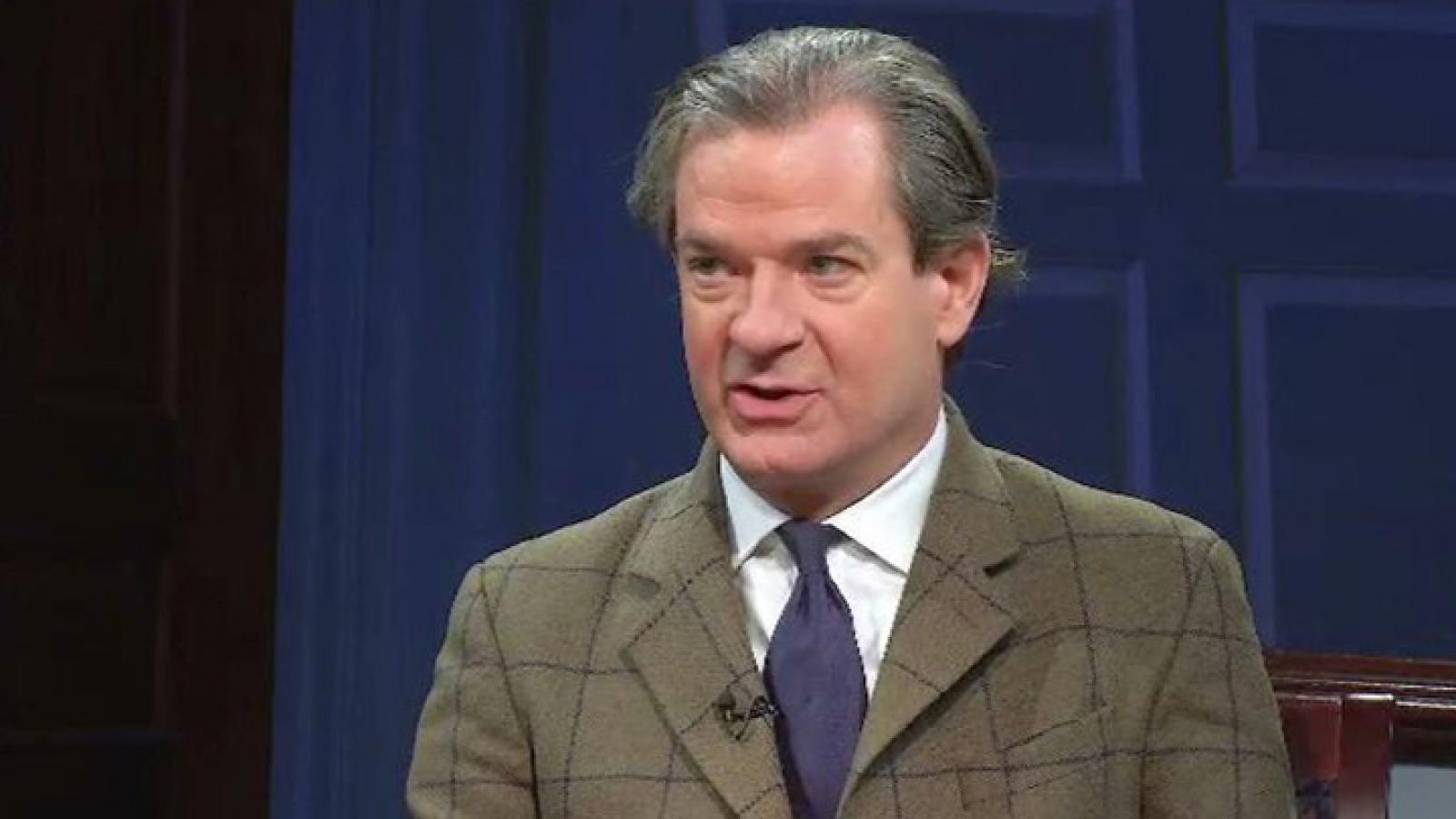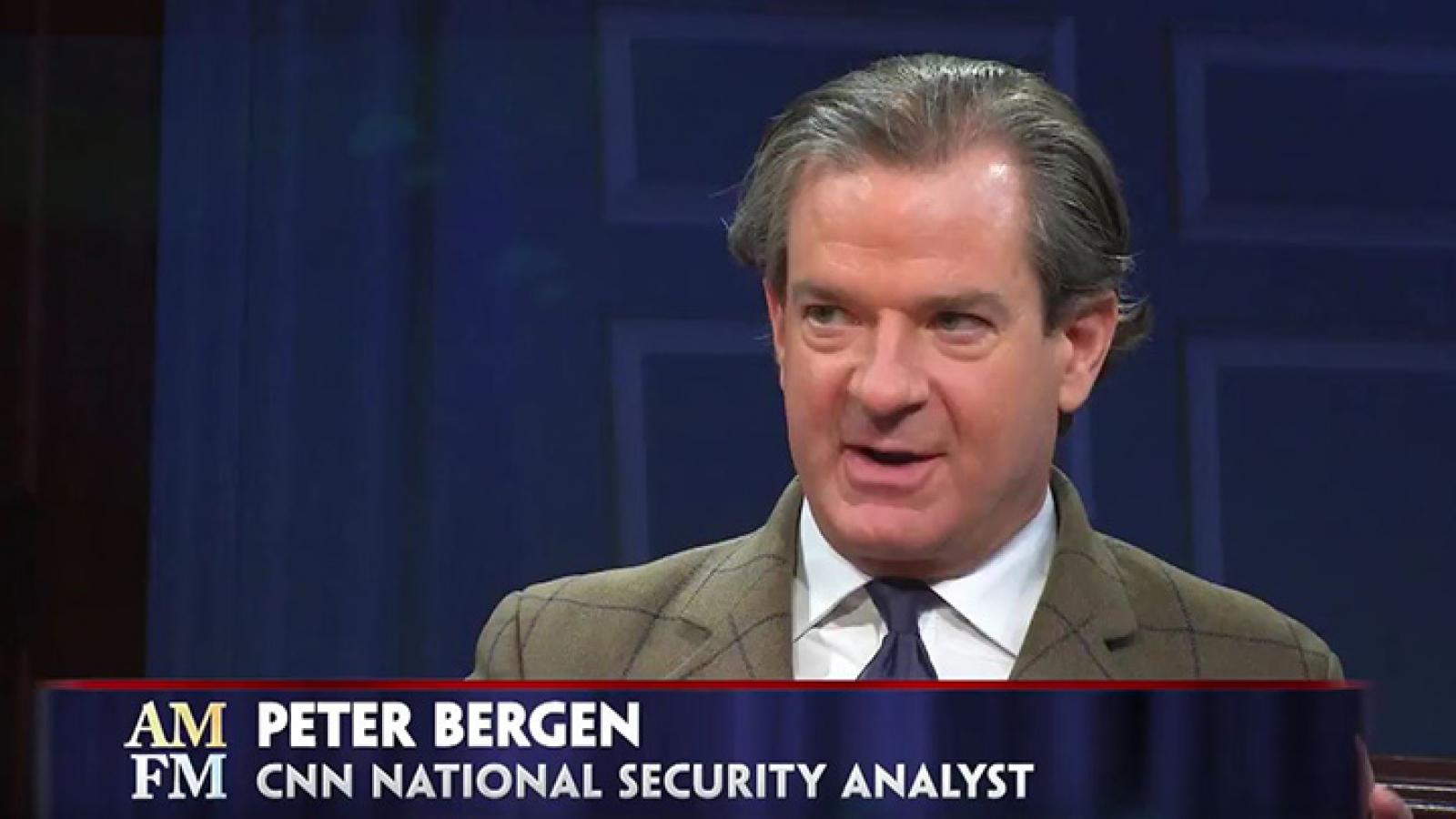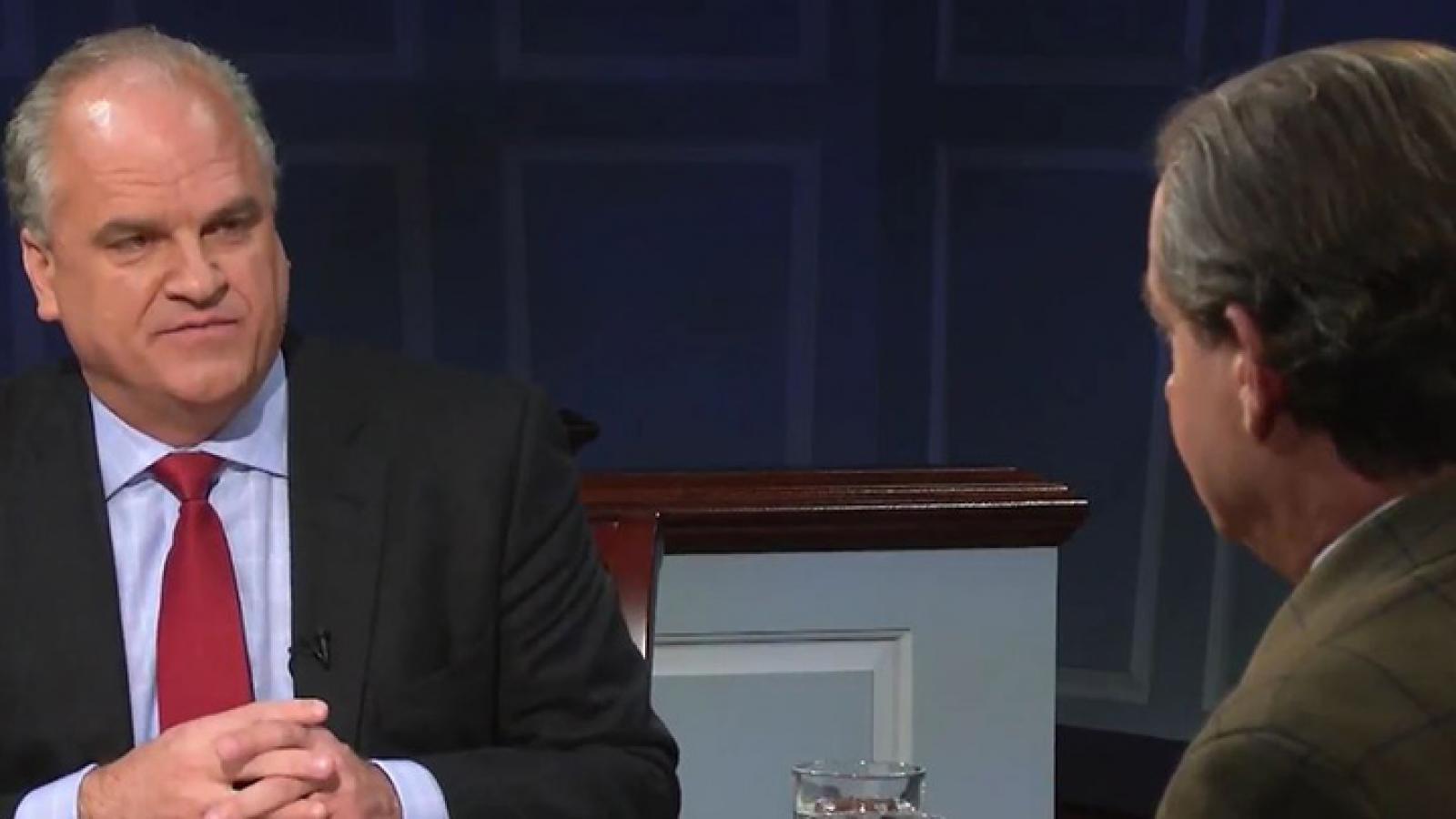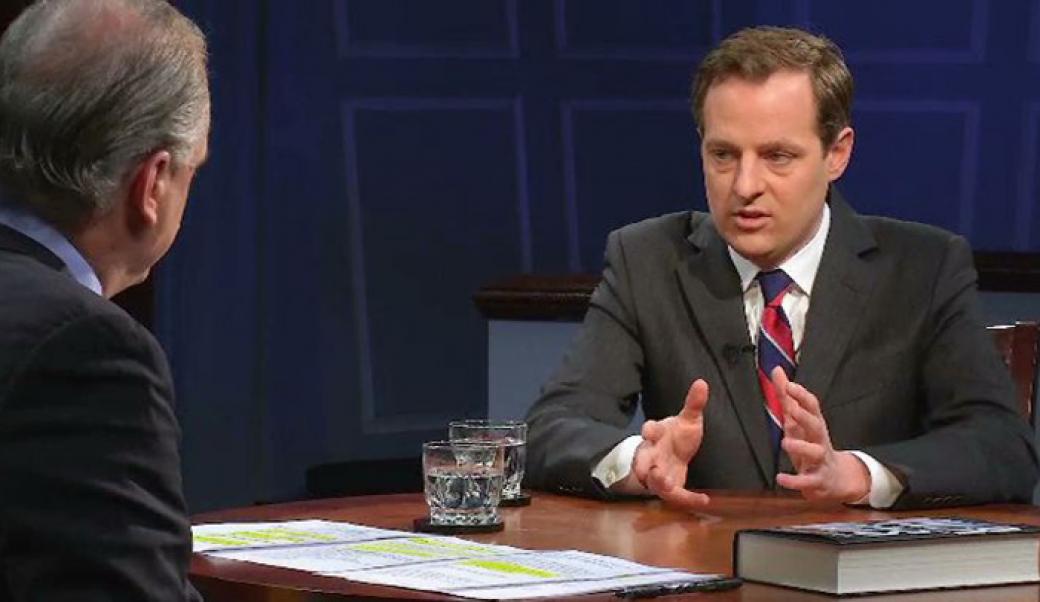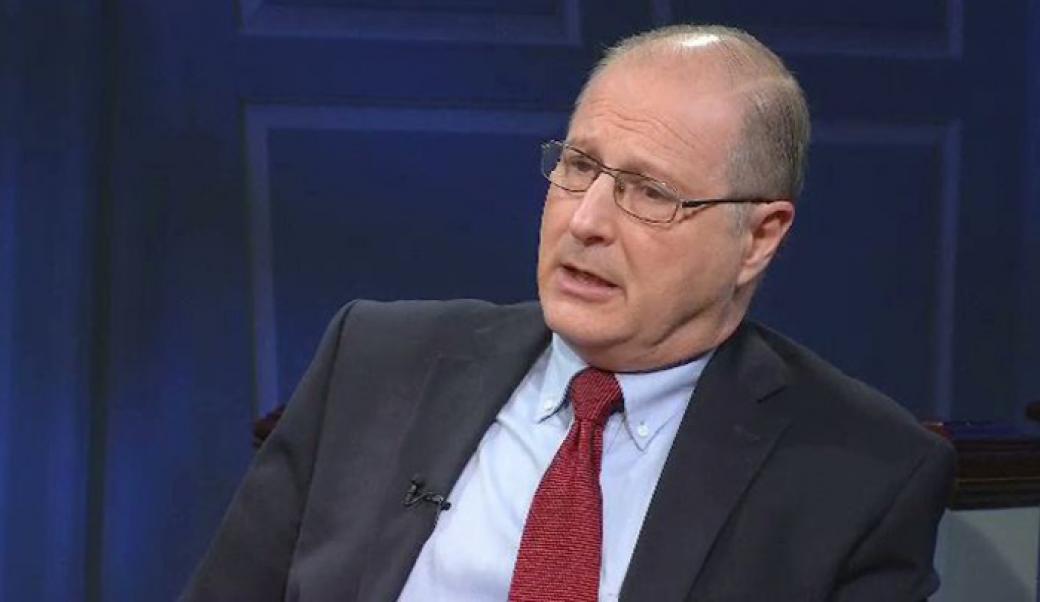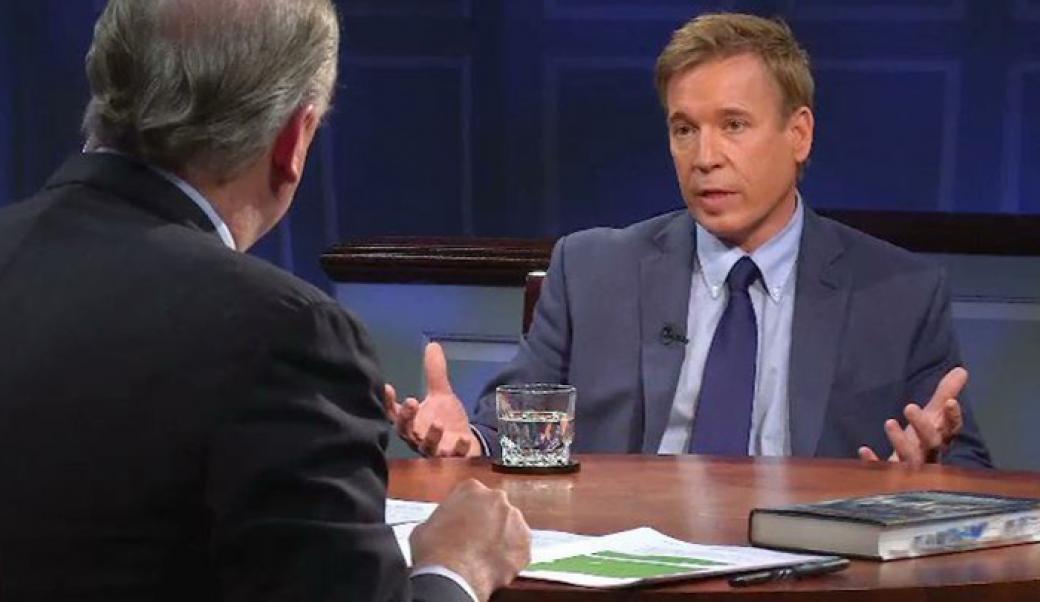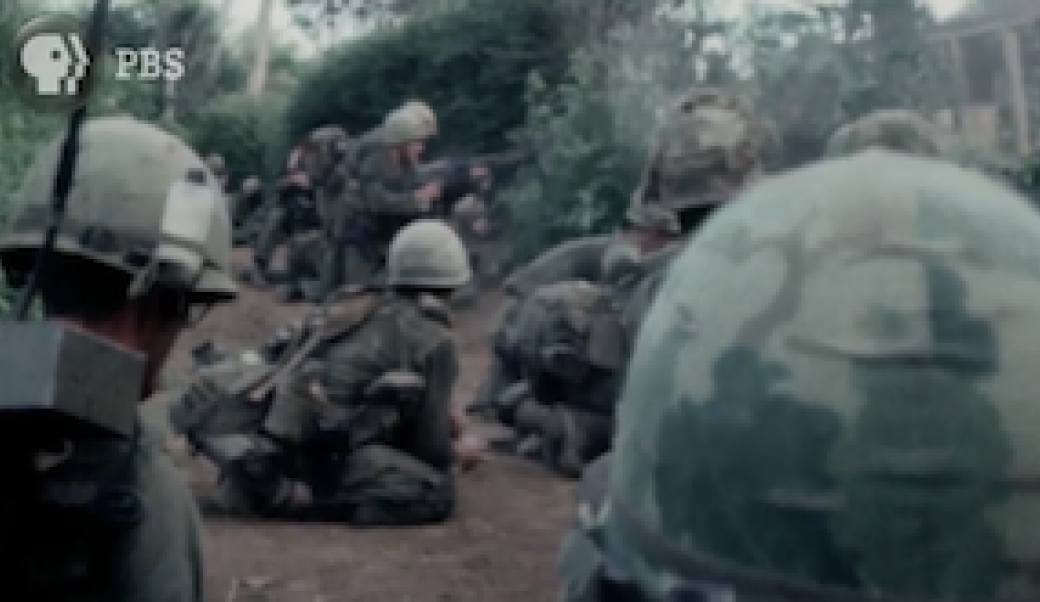About this episode
March 08, 2016
Peter Bergen
Peter Bergen's new book, "United States of Jihad," examines Americans who have embraced militant Islam both in the United States and abroad. Bergen, a CNN national security analyst, offers an inside look at the controversial tactics of the agencies tracking potential terrorists—from infiltrating mosques to surveillance; at the bias experienced by Muslims at the hands of law enforcement; at the critics and defenders of U.S. policies on terrorism; and at how social media has revolutionized terrorism.
War and Terrorism
United States of jihad
Transcript
00:41 Douglas Blackmon: Welcome back to American Forum. Within minutes of the terrorist attacks on the World Trade Center and Washington DC in 2001, there was fear across the United States that al-Qaeda “sleeper cells,” might be hiding among us. Wildly inaccurate media reports in those early days suggested that some of the 9/11 hijackers had lived in the U.S. for long periods, with wives and children, patiently and peacefully waiting for the ideal moment to wreak destruction on their unsuspecting American neighbors. Soon enough, those reports were debunked. The terrorists who attacked on 9/11 had all come from far away, and never meaningfully infiltrated or integrated fully into American society or even immigrant communities or mosques. But fast forward more than a decade, and look at the most recent horror on American soil. It looks a lot closer to what we so feared 15 years ago: an attack by a husband and wife team, inspired by the terrorist group called ISIS, slaughtering 14 co-workers and injuring more than 20 others at a holiday office party in San Bernardino, California. Do Americans face a coming wave of these “homegrown terrorists,” nearly impossible to identify, operating independently as “lone wolves,” attacking our society where it is most vulnerable and least defended? In this episode, we’re returning to our ongoing series of special programs called “Aftermath of the Endless War.” in which we’ve gathered soldiers, generals, diplomats and journalists, to discuss the consequences of the long 9/11 War for American society, our military, and our place in the world. Joining us in this episode is Peter Bergen, CNN’s national security analyst, and a longtime expert on global terror groups. He is also a vice president at the nonpartisan New America Foundation. In 1997, he produced for CNN the television interview in which Americans saw for the first time a then obscure figure named Osama Bin Laden and heard him declare war on the United States. He has written numerous books on national security. And his latest is United States of Jihad: Investigating America’s Homegrown Terrorists. Peter, thank you for joining us.
FACTOID: San Bernardino attacks in December 2015 killed 14, hurt 22
Peter Bergen: It’s good to be back.
02:58 Blackmon: The real question that I have about this whole issue of homegrown terrorists, and you’ve written a book, the title of which is United States of Jihad, and I think most people would react to this book with the assumption that it’s a warning call about a surge of coming terrorism of this particular type. But that’s not exactly what you say in this book, so how big a threat is this very terrifying possibility of organic homegrown terrorists?
FACTOID: The Question: Are homegrown terrorists really a big threat?
Bergen: Well there’s a certain paradox, which Americans are currently preoccupied with, which is 80 percent of Americans are somewhat or very concerned about a terrorist attack, 24 percent of Republicans think it’s the most important issue in the election, nine percent of Democrats. But the actual statistical likelihood of anybody is this room or watching this show being killed by a terrorist is vanishingly low, close to zero. But you know perhaps that get to one of the paradoxes of terrorism, it’s designed to terrorize, and you mentioned the Christmas party in San Bernardino in the intro. You know, people attending Christmas office parties don’t assume that it’s a strong possibility or at all likely that they might get mowed down in a terrorist attack. I guess I call it United States of Jihad because I thought it was an interesting title, there’s perhaps a little bit of irony in there, buried, because we have sort of overreacted in a sense, and some of that is very understandable. 9/11 was one of the hinge events for American history. But I think it’s still interesting, myself and my research team assembled more than 300 cases for the book of people, Americans, almost entirely Americans, who had been charged in this country of some kind of Jihadist, terrorist crime from the serious to the trivial, or the relatively trivial. You know, it’s interesting that a decade and a half after 9/11, last year there were more of these cases than any year since 9/11. So why would an American sign up, why would he sign up, and now in some cases she sign up, for a group or a ideology that at its core wants to kill other Americans, and that’s an interesting psychological question.
05:14 Blackmon: Is it a rising threat, or is it just a something similar to what it’s been for the past 10 years?
Bergen: Well I think it’s a persistent, low-level threat. I thought the death of Bin Laden and the rise of the Arab Spring that these would be the bookends of the war on terror. I mean, that would Al Qaeda had no role in the Arab Spring, Bin Laden died, Al Qaeda central was more or less destroyed, and yet unfortunately the Arab Spring turned into the Arab Winter and it turned out to be a very rich environment in Libya, and in Syria, and Iraq and to some degree Egypt and lots of other countries for ISIS and, in fact, Al Qaeda affiliates in other places to continue to exists. And so to threaten the United States is pretty low, I think, because we’re protected by our geography, and we’re also protected by and while there have been Americans signing up for ISIS, it’s nothing on the scale of what we see in France where we’ve had 1,500 Frenchman have gone to Syria, several have come back. If you look at the Paris attacks, most of the perpetrators were trained in Syria, and we just don’t have that in this country.
FACTOID: Arab Spring began in Tunisia in 2010, spread to other Arab states
06:16 Blackmon: A year ago, there was all this very excited coverage of this idea of how many Westerners appeared to be headed to join up with ISIS, but when we talked about it then, I think what you said was that at that stage there had been 62 Americans been identified as having made it to Syria. Has that number significantly changed?
Bergen: Well there’s a series of numbers. Two hundred fifty have either gone or have attempted to go to Syria, and it’s not clear which groups they’ve joined. I think the most that have joined ISIS from the United States we’re looking at the absolute most, dozens. And by the way, going to Syria and fighting with ISIS is very dangerous. It’s a one-way ticket for most of these people. They often die over there. Very few have come back, in fact the only two Americans that we know who have come back after being trained by a Jihadi group in Syria were trained by Nusra, which is the al-Qaeda affiliate you don’t hear a lot about. But Nusra controls about a third of Syria, and is actually doing a better job of, they don’t behead. They’re still an appalling group, but they’re making friends, and they’re making allies. My guess is in the long term Nusra might have more staying power in Syria than ISIS.
FACTOID: ISIS seized large territory in portions of Syria and Iraq
07:33 Blackmon: You make a good point, you referred to, just a second ago, that the situation in the U.S. is really profoundly different that it is in Europe. In the book you mention as basic a thing as that you can drive from Syria to Paris, and you can’t drive from Syria to the U.S. So by geography we’re protected from a lot of things. But what we’re not protected from is this idea of people within the society who become radicalized. And so, but is the fact that there has been relatively little of this kind of activity, even though it feels like we’re quite vulnerable to it. All of us have had a sense at a football game or something, to look around and say, wow it would be really easy actually for someone to do something really terrible in this place. But we’ve had so little of that, is that because through our defensive system and police enforcement that we’re doing a really good job of preventing these things from happening, or is it because there are not that many people who have these impulses?
Bergen: I mean I think it’s a little bit of both. Just to throw out some statistics that are relevant: on 9/11 there were 16 people on the no fly list, now there are 47,000. There are also more than a million people on a larger list of people that would go into second rescreening if they tried to go on an American plane. Our defensive measures are pretty good. The reason why this is a problem, admittedly low level but a persistent problem, we’re pretty good about Al Qaeda has not tried to mount a serious attack on the U.S. since 2009, and so what we’re left with are these homegrown militants that are American. They’re as American as anyone in this audience or watching this program, who are radicalizing. They don’t go to a radical mosque, they don’t go to a training camp, they radicalized sort of in their home environment. And these are people that are not tied to a known terrorist organization. But today the lone wolf is part of a virtual pack, because once you get online and start inviting ISIS propaganda or maybe direct messaging with ISIS people in Syria or Turkey. You can be online with hundreds of people around the world who exactly share your views, who are constantly saying yes, you’re absolutely right, ISIS is creating an Islamic utopia, and kind of encourage you.
09:43 Blackmon: In San Bernardino, Syed Farook, the husband of that pair, I think some people have overlooked that while he’s from Pakistani descent, he was actually born in the U.S., his wife was born in Pakistan. But so there we have a very vivid example of the thing we’re most afraid of.
Bergen: So one of the takeaways of the 300 plus cases we looked at was that the profile is: average age was 29, third married, third kids, average education that was similar to other Americans, average incomes, low levels of criminality, low incidents of mental health issues, so they’re ordinary Americans. And in fact San Bernardino, when we came to that conclusion before San Bernardino, 27 and 28, he was making $70,000 a year, they are married, they have kids, both a part of the American middle class, they were living the American dream in a lot of senses. And yet, they go out and kill 14 coworkers. So when you get to the “why” question about anything, the more you know about it often the less clear that it is because you can say maybe Major Nidal Hasan was clearly an Islamic fanatic when he killed these 13 soldiers and one civilians at Fort Hood.
FACTOID: 2009 shooting at Fort Hood, Texas killed 13 and wounded 32
FACTOID: Nidal Hasan was sentenced to death for Fort Hood Massacre
Well I talked to his cousin who grew up here in Virginia, Nader Hasan, and they’re double first cousins so genetically they’re almost brothers, and they grew up like brothers, and Nader is a successful criminal defense lawyer in Arlington, and his brother went on the be an army major, and then of course a mass murderer. His cousin says that Major Nidal Hasan basically went postal and sort of dressed it up in the garb of Islam. He was unmarried; about to turn 40, he probably had no relationships of any kind, no sexual relationship. He had no friends; he was very concerned about deploying to Afghanistan, so when you really begin looking into the details of these cases, yes, Islamic theology of a certain stripe can be influential. My wife is from Louisiana, I’m going to use this metaphor. It’ usually a kind of gumbo of different things and different kind of ingredients, there’s Islamist theology, there’s personal disappointments, there’s frustration with American Foreign policy, but for each person it’s a little bit different. And this gets back to the “why” question. Lots of people object to American foreign policy, lots of people have personal disappointments. Very few of them go out and kill innocents. You know, The Boston Marathon bombers killed an innocent eight year-old boy, severely wounded, severely wounded his sister who was also very young, killed a Chinese exchange student, age 23, and killed a restaurant manager aged 29, female. For what? I mean it’s utterly pointless. Did that make any difference with American foreign policy?
FACTOID: Boston Bombers claimed revenge for innocent Muslims killed by U.S.
FACTOID: Boston Marathon Bombers originally came from Kyrgyzstan
12:28 Blackmon: But in the end what’s really the difference between him, uh, and, uh, someone who walks into an elementary school and opens fire and kills a bunch of children?
Bergen: Well that’s a very good point. That’s equally inexplicable and pointless. Um we can have a discussion about gun violence in this society. I mean we live in an exceptional country but one of the exceptionalisms is the rate at which we kill each other with, with weapons. You know in Britain in 2010 there were 41 gun murders, in the United States there were 10,000. I mean it sort of orders a magnitude different. And you know we, the Second Amendment is the Second Amendment, um, and we can debate sort of the precise meaning, but the, the point is we have, we have a lot of violence in this country as a general rule compared to other Western Industrialize countries but then we also have. You know, a fair amount of political violence that isn’t just Jihadist in favor. And one of the I think points I make in the book is we have right-wing, extreme, right-wing terrorists and we had, you know, Neo-Nazis and they, they are killing people at a-a similar clip, uh, to the Jihadi terrorists.
FACTOID: Number of guns in U.S. exceeds total population of the country
13:28 Blackmon: Yeah, and I think that that gets at that the a very important distinction, that gets glossed over in the midst of our, uh, just how reflexively we react to, to anything that is called terrorism and particularly amid all of the talk about radical Islam and, and fascistic Islam and all those sorts of terms are thrown around. Uh, and that is that there really is a profound difference between something like 9/11, not just in terms of scale, but 9/11 was an elaborate conspiracy that involved dozens and dozens of people in addition to the 19 hijackers, and cost a very large amount of money, required months of planning, and positioning people far ahead of time, training to do very specialized tasks a-a very, very big military operation.
Bergen: Right, and what you’ve just outlined, you’ve outlined very well exactly the wh-what was required. We, The United States have, would be, would interfere with almost everything you’ve just outlined. We’d notice the money transfers from Dubai to Florida now, we’d, we’ve closed down the training camps in Afghanistan, we wouldn’t let these people into the country because they would be on a No Fly List. We have made it- We are much, much harder of a target. The likelihood a 9/11 attack is close to zero, you know. The likelihood of a Paris style attack is also very, very slim, uh, where you kill, you’ve got 130 people, you had a conspiracy involving dozens of people, people who’ve been trained in Syria. We are, we are left with these low level persistent threats, and of course you could have something like the Anthrax attacks where you have, uh, you know, somebody who knows quite a lot about micro-biology who becomes a Jihadist, I mean, that is not out of the realm of possibility, who is here in this country. But 9/11 that kind of thing is-is very unlikely.
FACTOID: Since 9/11, the U.S. has spent $791 billion on Homeland Security
Blackmon: It may be that it is actually a mistake to refer to San Bernardino uh as I’ve sometimes seen it referred to as an ISIS attack or something that’s an al Qaeda attack because in reality it is not an attack by either or those organizations, it might be inspired by the actions of those organizations or the the ideology of them, but it is in the end a these are individuals a who are, no more directly working at the behest of those organizations than one loony extremist who’s influenced by a white supremacist group and goes out and walks into a church in Charleston, South Carolina and kills 9 people uh, I mean the profiles of these things are probably not that far apart.
Bergen: In Paris we had an ISIS trained directed financed, organized attack, in San Bernardino we had an ISIS inspired attack in Garland, Texas we had the two perpetrators who tried to attack that their so called free speech event by, you know, they were both killed but they, that was an interesting meld because they were inspired by ISIS but they also started communicating with, direct messaging with people in ISIS, in Syria, over twitter. So um, what is that? You know, cause they, they were kind of in touch with ISIS and the ISIS was kind of telling them to do something, uh, so it was more of an inspired, so yo-you’re seeing these kinds of blended, uh, approaches. But what you’re unlikely to see in this country is some massive, you know, plot organized by some terrorist group outside our borders.
FACTOID: November 2015 attacks on Paris killed 130, wounded hundreds
16:29 Blackmon: And so what does that mean for either national security or for local law enforcement, what are the, what are the things that are being done that either work or don’t work in terms of trying to identify, uh, these folks or is it just as elusive as it is to try to identify who’s going to walk into a school or walk into a into a theater?
Bergen: Well I think that’s, that’s right I mean you know that’s the big thing, it’s you know until we have a machine that can read men’s souls and sometimes women’s souls, because some women are also engaged and some to much more of a degree, you know we can’t, when does a radical become a militant you know it’s an, and being a radical is not a crime in this country and uh- so, you know one of the chapters in the book I call “pre-crime” which is based on the Philip K. Dick novel that became a minority report, which is all about, you know basically, arresting people before they could do something, and that’s where the FBI is. You know, there’s a scene in the book where George W. Bush is talking about FBI director Robert Mueller the week after 9/11, so the first time they’ve met, a week after 9/11, and Mueller’s doing this elaborate presentation about the crime scene and al Qaeda and the evidence linking al Qaeda and at some point he says, George W. Bush says, “Bob, you gotta stop right there. This is what the FBI’s been doing, you know, since its inception. Your task is to prevent the next 9/11. Not to solve this massive crime. You know, obviously you need to do that.” But, and so he took that to heart and the FBI is really a domestic intelligence organization. You remember, and they, remember it was a big debate, should we have an MI5 like the British have, which is, you know, a domestic intelligence agency. That didn’t happen, but the De facto FBI has become a domestic intelligence organization and many you know, as I mentioned 2015 was the year with the most plots, but the FBI has uh you know is indicting people, investigating um investigations in 50 states and 900 investigations is a big amount of a law enforcement, uh, uh, directed, uh, effort at this. Almost all of those investigations are surely sting operations.
FACTOID: See millercenter.org for more Aftermath of Endless War
18:12 Blackmon: In terms of the broader, uh, th-the broader struggle right now uh with ISIS, what’s your sense of what’s happening? Or, uh, is ISIS in fact uh, are we making progress, are they contracting, or, or?
Bergen: Yeah, I think momentum has shifted against them, um, you know they lost Ramadi, it’s a big Iraqi city, um, the Iraqi army sort of seemed to hold that, offensive together. Uh, the United States dropped a bomb
FACTOID: Iraqi forces reclaimed Ramadi from ISIS in late December 2015
on, uh, a bank that ISIS had three quarters of a billion in currency and the New York Post had a wonderful headline, “U.S. makes large deposit,” which I thought was a pretty funny, often times the New York Post sort of really gets it right. But, so you, you know and as a result of it, ISIS has halved its salaries for its foot soldiers and, you know, they have a pretty big nut that they have to cover every month. If you’ve got tens of thousands of people on the payroll, you’re running a state. You know, it all costs money. And so, you know I think that we’re you know attacking the oil trucks, uh, attacking this bank, you know losing Ramadi. I mean, the it feels different. I think the momentum has shifted against them.
19:15 Blackmon: What does that say about the approach to the Obama administration has taken? They’ve been, you know, harshly criticized by a lot of people for being not, uh, masculine enough, um, not robust enough but . . .
Bergen: Well other than Lindsey Graham, who’s no longer in the race, no one, none of the Republican candidates have actually said what they would actually do, I mean, Ted Cruz said that he would carpet bomb, um, ISIS. Well, since ISIS is embedded in large Iraqi and Syrian cities that would of course produce vast civilian casualties, and it is not a serious plan. Only Lindsey Graham came up with an actual number, which he said 20,000. But even 20,000 would not be a, we had a 150,000 American troops during the, you know, the height of the Iraqi civil war, and barely got that under control, uh, once we had a better plan than General Petraeus. Um, so, the American public is not demanding 150,000, uh, servicemen and women to go to Syria to sort this out. I mean, no-nothing close. And so then we’re left with where we are. And I think the Obama administration is being rightly criticized for perhaps not being sufficiently forward with, with the U.S. special opera-operators. But already you can see that they’re changing that. Um, uh, they’re already, you know, being more aggressive, and part of it also is that we didn’t really know, we had no idea what was going on in Syria initially. Um, but I think our intelligence has improved dramatically if you look they took out the finance leader of ISIS, they took out Jihadi John, the, our intelligence is getting much better.
20:33 Blackmon: So as we go onto this next presidency, if you were, if you’re called in right after the inauguration and the, the new president says okay, what is the, what should be the top of my agenda on this, how do I avoid the mistakes of both of these past, these past two administrations?
Bergen: We’ve already learned from the set of mistakes that happened in Iraq and you can debate, you know, should the Obama have, administration have made more of a push to keep us there? Uh, the fact is that the Bush administration had negotiated that date, the fact is the Iraqis were under great pressure, pressure from the Iranians who, of course, were on their border, to kind of not continue with American presence. And if we’d had an American presence there after the end of the, uh, 2011, you know, would it have completely stopped ISIS coming? I don’t think so. But it would’ve certainly, I think, produced a better outcome, uh, than we saw, uh, in 2014.
FACTOID: Visit firstyear2017.org for more advice for the next U.S. president
21:19 Blackmon: And in terms of the threat of, uh, home-grown terrorists, whatever scale that may be.
Bergen: In a political season you’re not going to hear what’s true which is we’ve really managed and contained this threat for the reasons we’ve already discussed. And President Obama has already tried to make speeches to that effect. It really doesn’t seem to be persuading American public, American public are still very worried about this. Uh, but I think, you know, measures that we have in place are pretty, uh, are quite robust, um, you know, banning all Muslim immigration as Donald Trump has suggested I think would be, the whole point of this book is that, they’re Americans, they’re not immigrants. And by the way banning a Muslim migration would also turn the Muslim population against you and they’re the people that can be the most helpful. I mean, I mentioned Amar Majid who’s personally persuaded five American men not to join ISIS. You know, you want those people on your side, you don’t want them to be alienated. Um, so, you know there have been some, uh, sort of bumper sticker solutions that don’t make any sense.
22:12 Blackmon: One of the characters in your book, not someone you write a tremendous amount about but is this fellow Bernie Culveyhouse, uh, uh, did I pronounce that correctly?
Bergen: Yeah
Blackmon: Bernie Culveyhouse. The uh, I can’t remember if we’ve talked about this before or not but, you know, Danny Pearl, the first American journalist to be beheaded and the beginning really of this, that phenomenon was a friend of mine who, we worked together at the Wall Street Journal, uh, and one of the things that um, that jumped out at me was, you described in the book, this fellow Bernie Culveyhouse as someone who de-radicalized, um, in a sense, and part of what triggered that was that after having gone through this radical period he then saw a documentary film about Danny Pearl and what happened to Danny Pearl and that actually had this, the, this effect that
Bergen: Yeah.
Blackmon: Danny’s parents actually would be pretty profoundly please to know that I mean that’s . . .
Bergen: That’s a good point.
Blackmon: That some sliver of good um, uh, attached to any of that.
Bergen: It goes back to this question that I, I used this wonderful quote from Emmanuel Kant “out of the crooked timber of humanity not a straight thing is made” which I think is a way of saying that we’re all very complex and different, and so, Bernie Culveyhouse was the best friend of a guy called Omar Hammami, they did everything together for several years. Omah Hammami became a leader of Al Shabaab in Somalia. Bernie Culveyhouse went all the way down that path to radicalization and then stopped because he had a kid. Uh, his friend Omar who also had a kid kept going to Somalia and ended up being killed by Shabaab so the the point is that, even people with very very similar experiences, and these were almost identical, can make a different decision when it becomes the decision “shall I, sort of, carry on and become an actual violent militant?” Um, and Bernie Culveyhouse now lives in Silicon Valley, he’s got three kids, he’s married, and he’s living a, you know, he’s in the tech business. Um, and how did he arrive there and how did his friend Omar Hammami end up dead in Somalia is something I recount in the book. But at the end of the day, these particular triggers are, can be, you know are very variable on each person about why they just continue going down the path to violence.
24:15 Blackmon: But it certainly does seem that somewhere the, the one broad simple message is that that it’s in some kind of sustained human connection, not this, not this running away from each other, not this demonization of, of groups of people in such broad brush strokes, uh but somehow it’s encouraging that someone on the path to that isolated place where they then, you cross over into the dark, the dark part of this that actually some message that the world gives a damn that they exist in somewhere.
Bergen: Well you know the, uh, defense for, of religious freedom act which was in, uh, you know, uh, Thomas Jefferson wrote in Virginia, uh, he mentions Muslims specifically and and that became the basis or a basis for the first amendment. Um, so, you know as an idea this is not, uh, this is, eh, an idea that has been in the United States for a long time, which is Muslims are part of our community. And if we are seeking to, um, kind of alienate them we’re not gonna get the help that we need to find the, the home grown militants I profile in this book.
FACTOID: Virginia religious freedom statute created separation of church, state
FACTOID: 3.3 million Muslims lived in U.S. in 2025, about 1% of total population
Blackmon: Thank you for being here.
Bergen: Thank you.
Blackmon: Peter Bergen. His new book is United States of Jihad: Investigating America’s Home-Grown Terrorists. We hope you’ll join this conversation with American Forum on the Miller Center Facebook page, or by following us on Twitter, @Douglasblackmon or @AmericanForumTV, or @PeterBergenCNN. To send us a comment, watch other episodes, download podcasts, or read a transcript, visit us at millercenter.org/americanforum. I’m Doug Blackmon. See you next week.
